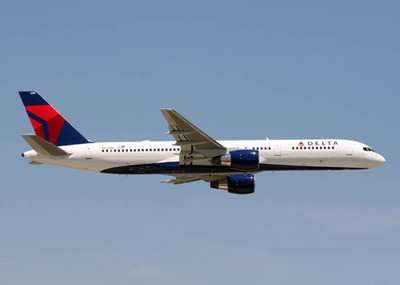Thu, Oct 16, 2008
Engines Should Be Pulled From Service Pending Checks, Board
Says
As a result of its ongoing investigation of an incident
involving a Pratt & Whitney PW2037 engine experiencing an
uncontained failure, the National Transportation Safety Board
issued an urgent recommendation Thursday to the Federal Aviation
Administration to require all Pratt & Whitney PW2037 engines be
removed from service for inspection of the second stage turbine
hubs when they have accumulated significantly fewer hours (10,880)
and/or cycles (4,392) than the incident engine.

On August 6, 2008, Delta Air Lines flight 624, a Boeing 757-232
equipped with PW2037 engines, experienced an uncontained failure of
the right engine’s high pressure turbine second stage hub at
McCarran International Airport in Las Vegas, NV.
According to the pilots, at the start of the takeoff roll they
heard a loud bang and observed that the right engine had lost
power. The pilots rejected the takeoff and the airplane returned to
the gate. All 166 passengers and the crew of four deplaned. There
was no fire or injuries.
 Examination of the incident airplane’s right engine
revealed a hole in the bottom of the core cowl that was in line
with a hole through the engine’s high pressure turbine. The
inspection also revealed missing lugs and cracks in the turbine
hub. Additionally, the Safety Board learned that at least four
other PW2037 second stage turbine hubs have had cracks in the blade
retaining lugs. And, NTSB has also learned that, during a routine
overhaul, an American Airlines PW2037 second stage turbine hub with
cracks in two adjacent blade retaining lugs was reported. The
Safety Board has requested information on all of these
hubs.
Examination of the incident airplane’s right engine
revealed a hole in the bottom of the core cowl that was in line
with a hole through the engine’s high pressure turbine. The
inspection also revealed missing lugs and cracks in the turbine
hub. Additionally, the Safety Board learned that at least four
other PW2037 second stage turbine hubs have had cracks in the blade
retaining lugs. And, NTSB has also learned that, during a routine
overhaul, an American Airlines PW2037 second stage turbine hub with
cracks in two adjacent blade retaining lugs was reported. The
Safety Board has requested information on all of these
hubs.
"These discoveries raise serious concerns and warrant immediate
action by the FAA," said NTSB Acting Chairman Mark V. Rosenker. "A
string of consecutively fractured blade retaining lugs could result
in the simultaneous release of multiple blades, which would exceed
the design capacity of the engine’s cases and result in an
uncontainment. Preventive safety measures must be taken."
The NTSB issued a second recommendation Thursday that would
require a continuing inspection schedule for the hubs until the
cause of previous instances of cracking is found and corrective
action is identified.
The Safety Board is still investigating this incident.
More News
Aero Linx: Model Aeronautical Association of Australia MAAA clubs are about fun flying, camaraderie and community. For over 75 years, the MAAA has been Australia’s largest fl>[...]
Touchdown Zone Lighting Two rows of transverse light bars located symmetrically about the runway centerline normally at 100 foot intervals. The basic system extends 3,000 feet alon>[...]
“Discovery and innovation are central to our mission at Virgin Galactic. We’re excited to build on our successful record of facilitating scientific experiments in subor>[...]
How To Get A Story On Aero-TV News/Feature Programming How do I submit a story idea or lead to Aero-TV? If you would like to submit a story idea or lead, please contact Jim Campbel>[...]
Student Pilot Reported That During Rotation, “All Of A Sudden The Back Of The Plane Kicked To The Right..." Analysis: The student pilot reported that during rotation, “>[...]
 ANN's Daily Aero-Linx (05.02.24)
ANN's Daily Aero-Linx (05.02.24) ANN's Daily Aero-Term (05.02.24): Touchdown Zone Lighting
ANN's Daily Aero-Term (05.02.24): Touchdown Zone Lighting Aero-News: Quote of the Day (05.02.24)
Aero-News: Quote of the Day (05.02.24) ANN FAQ: Contributing To Aero-TV
ANN FAQ: Contributing To Aero-TV NTSB Final Report: Cirrus Design Corp SR20
NTSB Final Report: Cirrus Design Corp SR20




